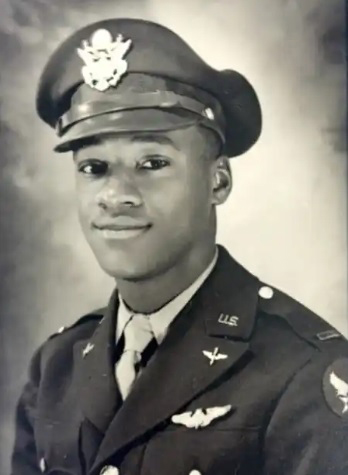ROME, N.Y. (AFRL) — Herbert Thorpe, a Tuskegee Airman and electrical engineer at the former Rome Air Development Center, passed away at age 101 in Westmoreland, New York, Jan. 28, 2024.
“As a Tuskegee Airman Mr. Thorpe’s service reminds us that we are all part of something greater than ourselves. His example of integrity, service, and excellence will endure,” said Air Force Research Laboratory Commander, Maj. Gen. Scott Cain. “I had the great pleasure of sharing in his contributions to our service. His words, actions and dedication to our country are an inspiration to so many Airmen and Guardians.”

Herbert Thorpe, a Tuskegee Airman and electrical engineer at the former Rome Air Development Center, passed away at age 101 in Westmoreland, New York, Jan. 28, 2024. Mr. Thorpe played a key role in the research and development of the Identification Friend or Foe (IFF) system at the Rome Air Development Center. The system was designed for command and control purposes and employs a transponder that listens for an interrogation signal and then sends a response to identify the broadcaster.
Thorpe enlisted in the U.S. Army Reserve in 1942 and started his active-duty service in 1943. He attended Signal Corps School before applying and being accepted to Aviation Cadet School the same year. He completed his altitude testing at Keesler Field, Mississippi, and then transferred to Tuskegee Institute, Alabama, for Primary Flight School. He was later transferred to Tuskegee Army Air Field, or TAAF, for Basic Training Flight School and was selected for multi-engine training. Thorpe then attended Gunnery School in Florida and Bombardier/Navigator School in Texas.
After being commissioned as a second lieutenant as a navigator/bombardier Dec. 30, 1944, in Midland, Texas, Thorpe went back to Tuskegee to attend Advanced Flight Training School. He qualified as a B-25 twin-engine pilot at TAAF in October 1945 and served there until he left the military in August 1946.
Thorpe attended New York University under the GI Bill and graduated with a degree in electrical engineering in 1953. After that, he worked as a radar systems engineer at the Brooklyn Navy Yard from 1955 to 1959.
According to AFRL historical documentation, Thorpe played a key role in the research and development of the Identification Friend or Foe (IFF) system at the Rome Air Development Center. The system was designed for command and control purposes and employs a transponder that listens for an interrogation signal and then sends a response to identify the broadcaster. IFF is used to identify aircraft, vehicles, or forces as friendly, neutral or hostile, and to determine their bearing and range from the interrogator. It is utilized by both military and civilian aircraft for air traffic control purposes.
During the dedication of the Heritage Room in his honor on July 27, 2023 at AFRL’s Information Directorate in Rome, New York, Thorpe reflected on the early research he conducted there.
“I am honored to receive this dedication,” he said, “but I receive it with my brother, here in my heart.”
In 2016, Herbert Thorpe and his brother Richard were awarded the Congressional Gold Medal for their military service. Herbert Thorpe was also recognized for his efforts in establishing the Mohawk Valley Chapter of the NAACP, receiving the first New York State Dr. Martin Luther King, Jr. Humanitarian Award in 2012 and again in 2013. Additionally, he was awarded the Rome Historical Society’s 1777 Medal of Honor.
The Tuskegee Airman dedicated his time to bettering the lives of all Airmen. Often sporting his red Tuskegee Airmen cap, Thorpe advocated for aviation and equal treatment of Airmen, regardless of their backgrounds.
“In July, Mr. Thorpe and his family celebrated the dedication of our Heritage Room at the Lab, in his honor,” said Col. Fred Garcia, commander of AFRL’s Information Directorate. “He spent time with Airmen, both civilian and military, and influenced and taught them with his conversation and wisdom. Mr. Thorpe has demonstrated to us all that it’s the way you face your challenges that gives you the fortitude to succeed.”
“Getting to know and spend time with him was an honor and a true joy, and my heart is with his family and all those affected by his passing” Garcia stated. “Mr. Thorpe is a true inspiration, and his spirit will live on forever at Rome Labs.”
About AFRL
The Air Force Research Laboratory is the primary scientific research and development center for the Department of the Air Force. AFRL plays an integral role in leading the discovery, development, and integration of affordable warfighting technologies for our air, space and cyberspace force. With a workforce of more than 12,500 across nine technology areas and 40 other operations across the globe, AFRL provides a diverse portfolio of science and technology ranging from fundamental to advanced research and technology development. For more information, visit www.afresearchlab.com.

